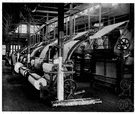calender
Also found in: Thesaurus, Legal, Encyclopedia, Wikipedia.
calender
a machine that presses cloth or paper through rollers: The laundry used a calender to press the sheets.
Abused, Confused, & Misused Words by Mary Embree Copyright © 2007, 2013 by Mary Embree
cal·en·der
(kăl′ən-dər)n.
A machine in which paper or cloth is made smooth and glossy by being pressed through rollers.
tr.v. cal·en·dered, cal·en·der·ing, cal·en·ders
To press (paper or cloth) in the rollers of such a machine.
[French calandre, from Vulgar Latin *colendra, alteration (possibly influenced by Latin columna, column) of Latin cylindrus, roller; see cylinder.]
cal′en·der·er n.
American Heritage® Dictionary of the English Language, Fifth Edition. Copyright © 2016 by Houghton Mifflin Harcourt Publishing Company. Published by Houghton Mifflin Harcourt Publishing Company. All rights reserved.
calender
(ˈkælɪndə)n
(Mechanical Engineering) a machine in which paper or cloth is glazed or smoothed by passing between rollers
vb
(Mechanical Engineering) (tr) to subject (material) to such a process
[C17: from French calandre, of unknown origin]
calender
(ˈkælɪndə)n
(Islam) a member of a mendicant order of dervishes in Turkey, Iran, and India
[from Persian kalandar]
Collins English Dictionary – Complete and Unabridged, 12th Edition 2014 © HarperCollins Publishers 1991, 1994, 1998, 2000, 2003, 2006, 2007, 2009, 2011, 2014
cal•en•der
(ˈkæl ən dər)n., v. -dered, -der•ing. n.
1. a machine in which cloth, paper, or the like is smoothed, glazed, etc., by pressing between rotating cylinders.
2. a machine for impregnating fabric with rubber, as in the manufacture of automobile tires.
v.t. 3. to press in a calender.
[1505–15; < Middle French calandre]
cal′en•der•er, n.
Random House Kernerman Webster's College Dictionary, © 2010 K Dictionaries Ltd. Copyright 2005, 1997, 1991 by Random House, Inc. All rights reserved.
calender
Past participle: calendered
Gerund: calendering
| Imperative |
|---|
| calender |
| calender |
Collins English Verb Tables © HarperCollins Publishers 2011
ThesaurusAntonymsRelated WordsSynonymsLegend:
Switch to new thesaurus
| Noun | 1. |  calender - a machine that smooths or glazes paper or cloth by pressing it between plates or passing it through rollers calender - a machine that smooths or glazes paper or cloth by pressing it between plates or passing it through rollersmachine - any mechanical or electrical device that transmits or modifies energy to perform or assist in the performance of human tasks |
| Verb | 1. | calender - press between rollers or plates so as to smooth, glaze, or thin into sheets; "calender paper" press - place between two surfaces and apply weight or pressure; "pressed flowers" |
Based on WordNet 3.0, Farlex clipart collection. © 2003-2012 Princeton University, Farlex Inc.
Translations
Collins German Dictionary – Complete and Unabridged 7th Edition 2005. © William Collins Sons & Co. Ltd. 1980 © HarperCollins Publishers 1991, 1997, 1999, 2004, 2005, 2007
Collins Italian Dictionary 1st Edition © HarperCollins Publishers 1995